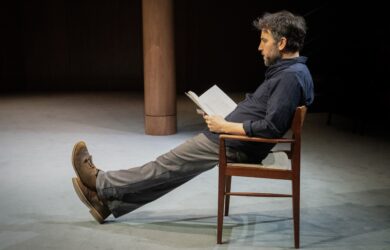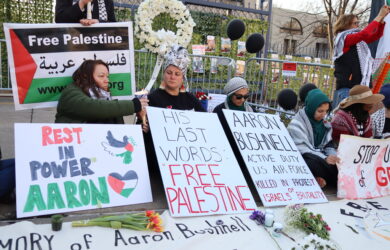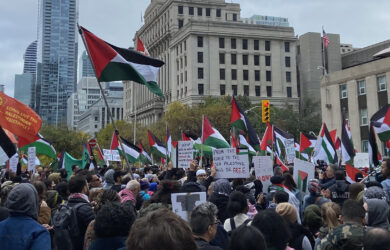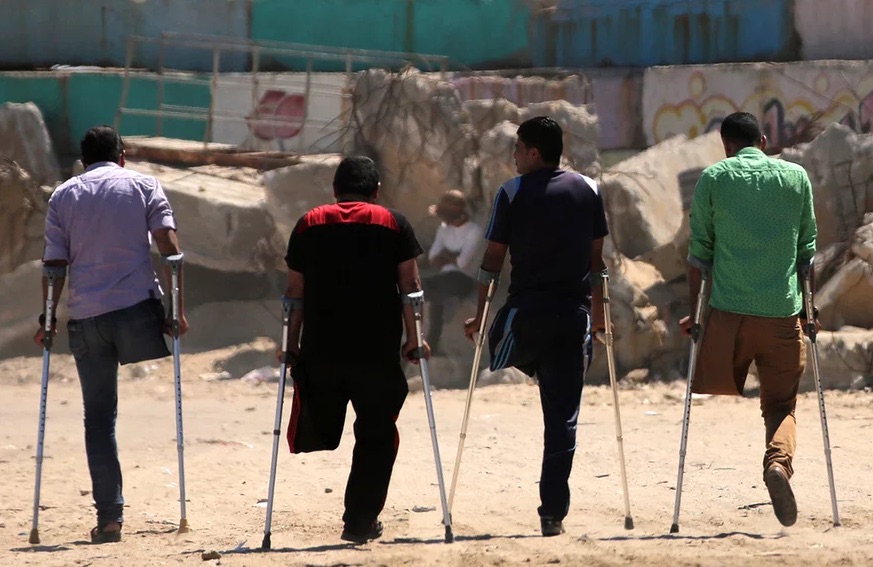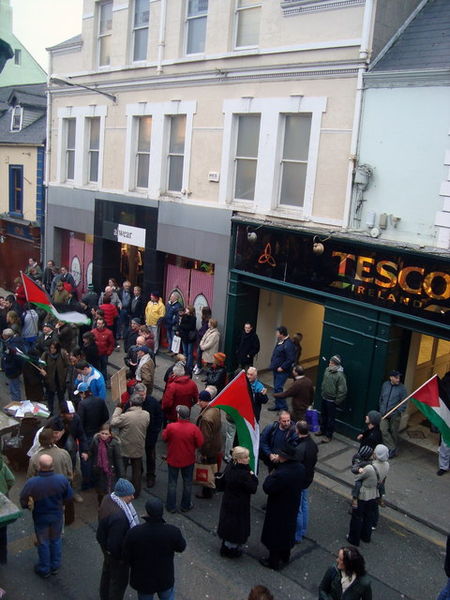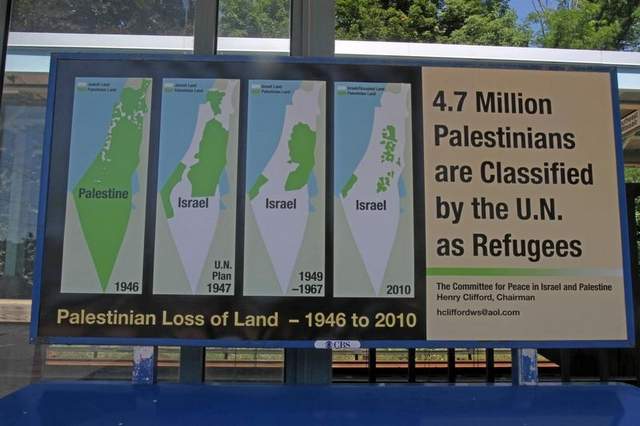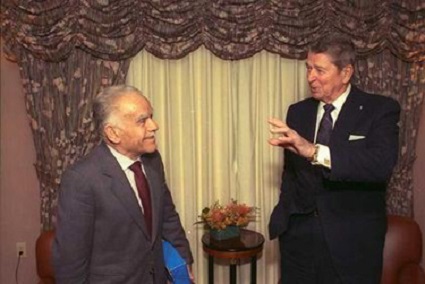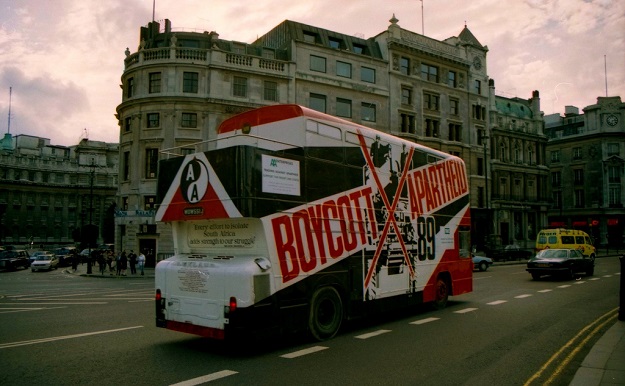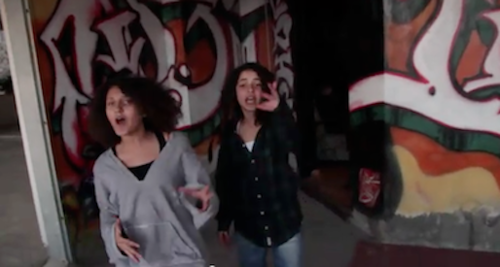In Itamar Moses’s new play The Ally, the “trickiest question”—“whether the fight against anti-Semitism belongs as a coequal branch of the social justice movement”—is itself a kind of trick question. Articulated through Moses’s academic alter ego in the play, Asaf … Continue reading “Parsing the Jewish American Complex”
Tag: Israel
To Extinguish: On Aaron Bushnell and the Casualties of Nonviolence
Sharon LukI haven’t watched the livestream of US Senior Airman Aaron Bushnell’s self-immolation in front of the Israeli consulate in Washington, DC, on February 25, 2024, but many of us are familiar with reports and transcripts telling of a police officer, … Continue reading “To Extinguish: On Aaron Bushnell and the Casualties of Nonviolence”
Genocide and Campus Bans on Speech Critical of Israel: Then and Now
Sherene H. RazackNot a single day goes by now in North America or Europe without an academic being disciplined or fired outright for expressing views critical of Israel. In mid-March 2024, when the University of California Regents meet at UCLA, they will … Continue reading “Genocide and Campus Bans on Speech Critical of Israel: Then and Now”
Justice Without Exception: Zionist Narrative and the Crisis of Liberalism
Niko BlockTwo weeks after Israel began bombing Gaza, I was messaging with a close friend who now lives in New York. I had long known her to support Palestinian liberation, but now her tone was different. She expressed that too many … Continue reading “Justice Without Exception: Zionist Narrative and the Crisis of Liberalism”
Society for Sick Societies: Domestic Inspectors
Daniel MannSociety for Sick Societies is a diagnostic project. Built as a series of episodes, each one of its vignettes sets out to analyze an expressed symptom of a sick society–a practice, pattern, gesture, proverb, or technique that seems to encapsulate … Continue reading “Society for Sick Societies: Domestic Inspectors”
Society for Sick Societies: Media Itineraries
Laliv MelamedSociety for Sick Societies is a diagnostic project. Built as a series of episodes, each one of its vignettes sets out to analyze an expressed symptom of a sick society–a practice, pattern, gesture, proverb, or technique that seems to encapsulate … Continue reading “Society for Sick Societies: Media Itineraries”
Disabling Wounds: Genocidal Violence, Paradoxical Indigeneity, and the Logic of Elimination of the Native
J. Kēhaulani KauanuiBuilding on the analytics she advanced in Terrorist Assemblages, Jasbir Puar brings her pathbreaking work on the liberal state, sexuality, and biopolitics to bear on our understanding of disability. In The Right to Maim, we see the tenuous inclusion of … Continue reading “Disabling Wounds: Genocidal Violence, Paradoxical Indigeneity, and the Logic of Elimination of the Native”
Putting Palestinians on a Diet
Helga Tawil-Souri“No prosperity, no development, no humanitarian crisis.” A senior official in Prime Minister Benjamin Netanyahu’s right-wing government purportedly once confided to a UN official that this was Israel’s goal for Gaza. Supressing without starving the population has been a prevalent … Continue reading “Putting Palestinians on a Diet”
Historicizing Palestinian Boycott Politics
Salah HassanA boycott is a difficult and demanding political tactic. To understand the logic of boycott politics, especially in relation to the Palestinian campaign for a cultural and academic boycott of Israel, one needs to locate it within a broader … Continue reading “Historicizing Palestinian Boycott Politics”
Back to History and Judgment
Samera EsmeirAn important achievement of the Boycott, Divestment, and Sanctions movement has been to help render the Question of Palestine more legible by releasing it from the framework of conflict resolution that has thus far dominated the peace process, the … Continue reading “Back to History and Judgment”
Peace Dividends
Alex LubinThe U.S./Israel special relationship is at once affective, geopolitically strategic, and rooted in economics. In this essay I suggest that the neo-liberalization of the U.S. economy during the Reagan administration was tied to the formation of international free trade … Continue reading “Peace Dividends”
The Efficacy of the Palestinian BDS Movement
Riham BarghoutiOn July 9, 2005, over 170 civil society organizations signed onto the Palestinian Call for boycott, divestment, and sanctions (BDS) against Israel. The Call, grounded in a history of the use of boycott by Palestinians and inspired by the … Continue reading “The Efficacy of the Palestinian BDS Movement”
Locke Down on BDS?
Robin D. G. KelleyIlya Schapiro of the right-wing Cato Institute recently appeared on Chris Hayes’ show on MSNBC to defend Arizona bill SB 1062 that would have allowed merchants to refuse service to LGBTQ customers under the guise of “religious freedom.” Schapiro … Continue reading “Locke Down on BDS?”
Arab Talk Interview: Neferti Tadiar on Palestine
Social Text Collective and Neferti X. M. TadiarArab Talk recently posted an archived interview with Social Text Collective Member and Co-Editor Neferti X. M. Tadiar about her trip to Palestine in 2012, sponsored by the USACBI. You can also read Tadiar’s article “Why the Question of Palestine … Continue reading “Arab Talk Interview: Neferti Tadiar on Palestine”
Hip Hop from ’48 Palestine: Youth, Music, and the Present/Absent
Sunaina MairaThe digital material presented here is meant to supplement the article “Hip Hop from ’48 Palestine: Youth, Music, and the Present/Absent” from the current issue of Social Text (30.3, Fall 2012). An abstract for the article can be read below.


